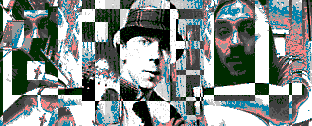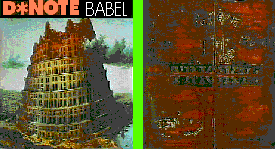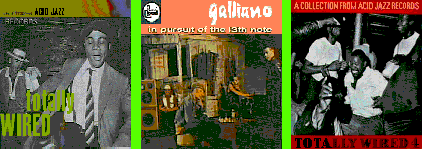

To make sense of the whole thing you have to go back to a time when there was no such thing as acid house. In those far off days before the second summer of love, London was home to a thriving scene of warehouse parties. The music played at them was a mixture of funk and disco. At the same time, there was also a scene of people into dancing to the frenetic beats of hard bop, Latin and Brazilian music at clubs like the Electric Ballroom and upstairs at the Wag.
 Some DJs, like Gilles Peterson would play across both these
scenes and so it went until the whole Balearic mix of Euro pop
and house blew up in places like Ibiza. DJs and crowds alike
converted en masse to this new, vibrant mix of beats and melodic
snippets to cries of acieeeed! As a rule the DJs playing
this music were the same ones who had been playing the funk only
months before and for a while at least all these musics
co-existed in the same clubs. After one set of acid house had
finished, Gilles Peterson went on to play some fast Brazilian
beat records, quipping that "if that was acid house this is acid
jazz."
Some DJs, like Gilles Peterson would play across both these
scenes and so it went until the whole Balearic mix of Euro pop
and house blew up in places like Ibiza. DJs and crowds alike
converted en masse to this new, vibrant mix of beats and melodic
snippets to cries of acieeeed! As a rule the DJs playing
this music were the same ones who had been playing the funk only
months before and for a while at least all these musics
co-existed in the same clubs. After one set of acid house had
finished, Gilles Peterson went on to play some fast Brazilian
beat records, quipping that "if that was acid house this is acid
jazz."
Together with Eddie Piller, Gilles went on to form Acid Jazz Records, although he left not long after to take up a position at Polygram's new dance label: Talkin' Loud. As early signings to Acid Jazz Records like The Brand New Heavies took off in a big way, the media scrabbled around for a tag and acid jazz seemed quite 'with it' in the days before anything with the 'acid' prefix appeared dated.
Acid jazz is bollocks. It's a record label not a genre of music
With most of the attention on the new acid house scene, the soul boy/warehouse scene and the jazz dance scenes fell into each others embraces and out of all this bands like Galliano, The Young Disciples and The Brand New Heavies emerged with a fresh take on a quintessencially British funk. At the same time, there was a revival in the more straight ahead jazz scene, with Courtney Pine and The Jazz Warriors becoming extremely popular. Some of the Jazz Warriors like Steve Williamson began to explore funk as well as the challenging jazz of saxophonists like John Coltrane. And the boundaries continued to blur.

The only thing which held the whole thing together was a recognition of what it was not. It was not house, nor was it indie and that was about it. If you could dance to it and it had sincerity, that was enough.
A couple of years ago, even this definition started to break down with groups like D*Note getting bored with the musical limitations of funk and they started exploring jazz harmonies with dance music. The cracks became more pronounced with the explosion of jungle onto the jazz scene and if you go to a club like That's How It Is with Gilles Peterson and James Lavelle (of Mo' Wax) you will hear jungle and house as well as all the types of music traditionally associated with the 'acid jazz' camp.

Of course, there is nothing new about all this. From the beginning of time, musicians have proved the most open-minded of people and it's hard to see how music could have developed at all without this healthy ethic of disregard for ideas like 'purity' and 'authenticity'. On the other hand, tags like 'acid jazz' sell records and that in turn keeps musicians afloat, so these terms are perhaps a necessary evil. The trick is not to take them too seriously, but to just enjoy the music.
![]() Interview by
Phenian
Interview by
Phenian
